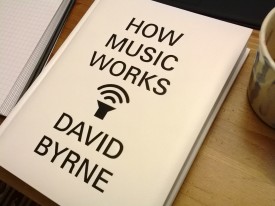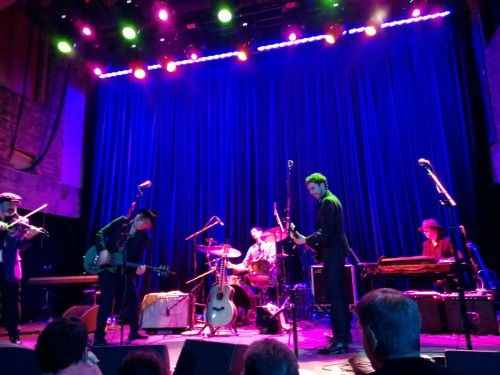Silver Moons
The Pop & Jazz blog

Books are like compressed conversations between the author and you, or me – the reader. In this light, “reviewing” a book has always felt a little wrong. A review is a capsulized response to a book and its author. When someone has poured untold hours of his or her life into something that readers will commit many hours of their lives to comprehending, passing judgment in the space of a few paragraphs feels a little smug. Last year’s How Music Works might well be the crowning achievement of Byrne’s career in the thick of popular culture. I say “might” to honor Byrne’s vitality and acknowledge my own uncertainty: I’m just embarking on my read.
As I set out, three years into writing and publishing Pop & Jazz, it occurs to me that blogging about it from time to time, rather than reviewing it in the traditional way, might be a fitting corollary to Byrne’s writing of the book. Byrne spent many private hours laying the groundwork for something he made public in an instant. I, on the other hand, came into possession of the book instantaneously and will spend many hours unpacking its contents. My side of the conversation will occur not in an explosive burst but in flurries of sparks showered over a stretch of weeks and likely months, during which I’ll be reading other things, listening to who knows what, and writing about much else, both here and in the pages of the zine.
I will of course have “final thoughts” once my reading and tangential listening are in some sense complete. More important, though, for a book so wide ranging and so dialed-in to my own pursuits and interests (reading, music history, the creative process, music and technology, music and place, the art of listening, and of course the music of David Byrne and Talking Heads), I will have immediate and visceral reactions to the ideas at play on each of Byrne’s 345 carefully designed pages. I’ll do my best to share those with you here.
4 December 2013
Finally finished issue 23, the longest a single issue has taken me. In part, I was getting my head around a lot of material, including the 4-CD box set Who’s That Man: A Tribute to Conny Plank, about which more later. Also, I got caught up in other things for a bit, as can happen. But here I am.
In this issue I discuss Neil Cowley Trio’s superb and delightful collection The Face of Mount Molehill. I’ll work on getting the essay itself posted here at the site. Meanwhile, I’ll share something the zine can’t deliver: performances by the Cowley trio itself!
Here’s the album version of “Rooster Was a Witness” in a beautiful video that was shot, from the looks of it, in a beer brewery.
And here’s a live performance from Montreux, a song from Molehill as it appears on last year’s Live at Montreux 2012 DVD and CD:
The spirit of musical adventure is alive and well.
7 November 2013
THE WATERBOYS
The Neptune Theater, Seattle
11 October 2013

Mike Scott’s band The Waterboys changed my conception of what rock music could be and what it could do. It’s not that Waterboys music is so very different from other rock (and folk rock, and folk) as music. At its best, it’s very good music, to be sure: Scott’s songs are pretty, groovy, gentle, or muscular, as the mood strikes him and as the songs require. The songs’s needs stem from their purposes. It’s the emphatic purpose with which Scott approaches his work that makes his music so powerful, so gripping, so irrepressible, so essential. Scott’s roots are in Scotland and Ireland, and he’s steeped in Anglo literary traditions. He loves those roots and that literature, and these loves pour forth in every note he sings and plays. That’s part of it.
Further, and more importantly, Scott is a thoroughly spiritual person. I don’t share his embrace of Christian-leaning mysticism, but I thrive on the searching and grasping in so many of his lyrics, and I relish his sustained focus—album to album, if not song to song—on what matters: attaining understanding, seeing things whole, spiritual rebirth, human aspiration and dignity, the drive to action, the importance of just action, the importance of reflection, the importance of place. I also love his attention to celebration, whether he’s playing up a mood, a spirit, people he knows, or life itself. He’s after wisdom, and wisdom transcends cosmological outlooks. It cuts to the heart of what it is to be human and what it means to live a good life.
Throw in a penchant for music of scale, music that gets as thunderous and huge and direct as only amplified rock music can get, coupled with a nuanced appreciation for the fact that music loses its power and its scale when it’s always as loud as it can possibly be, and we’re in range of what makes this man and this band, whoever plays in service of its material, so incredibly special. There’s unfinished business here for me, much more that needs saying, about big music generally and The Waterboys in particular. Suffice it to say, for now, that Scott remains, now as over the past three decades, a man and a musician of infectious vitality. Time spent in his company, in theaters or with recordings, is time spent in the presence of living ideas, words as agents of power, and music that fires the soul.
The band that played last week…
Mike Scott, vocals, guitar, piano
Steve Wickham, electric fiddle
Jay Barclay, lead guitar
Daniel Mintseris, keyboards
Malcolm Gold, bass
Chris Benelli, drums
…and, the songs they played. The night saw a considered mix of songs new and old, featuring music from the band’s 1983 debut, a pair of unrecorded compositions, and several songs from last year’s ambitious and rewarding album An Appointment with Mr. Yeats, musical adaptations of works by the Irish poet William Butler Yeats (1865–1939).
01 – Strange Boat
02 – Fisherman’s Blues
03 – A Girl Called Johnny
04 – She Tried to Hold Me
05 – Still a Freak [NEW]
06 – The Girl in the Swing
07 – Song of Wandering Aengus
08 – When Ye Go Away
09 – Glastonbury Song
10 – White Birds (“Yeats’s supreme love song”)
11 – Spirit (Scott solo on electric keys)
12 – The Whole of the Moon
13 – I Can See Elvis [NEW]
14 – The Raggle-Taggle Gypsy (Scott and Wickham duet)
15 – Mad as the Mist and Snow (with Yeats’s The Second Coming)
16 – Don’t Bang the Drum
=================================
17 – We Will Not Be Lovers
18 – How Long Will I Love You
19 – Your Cheatin’ Heart (Hank Williams cover)
20 – Be My Enemy
[2 hours]
19 October 2013


